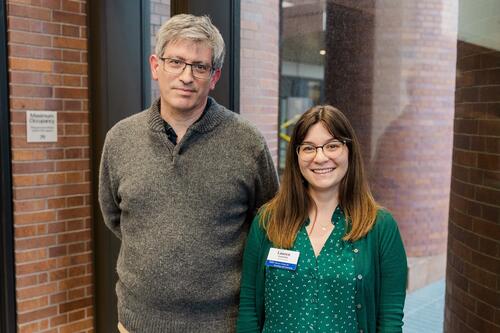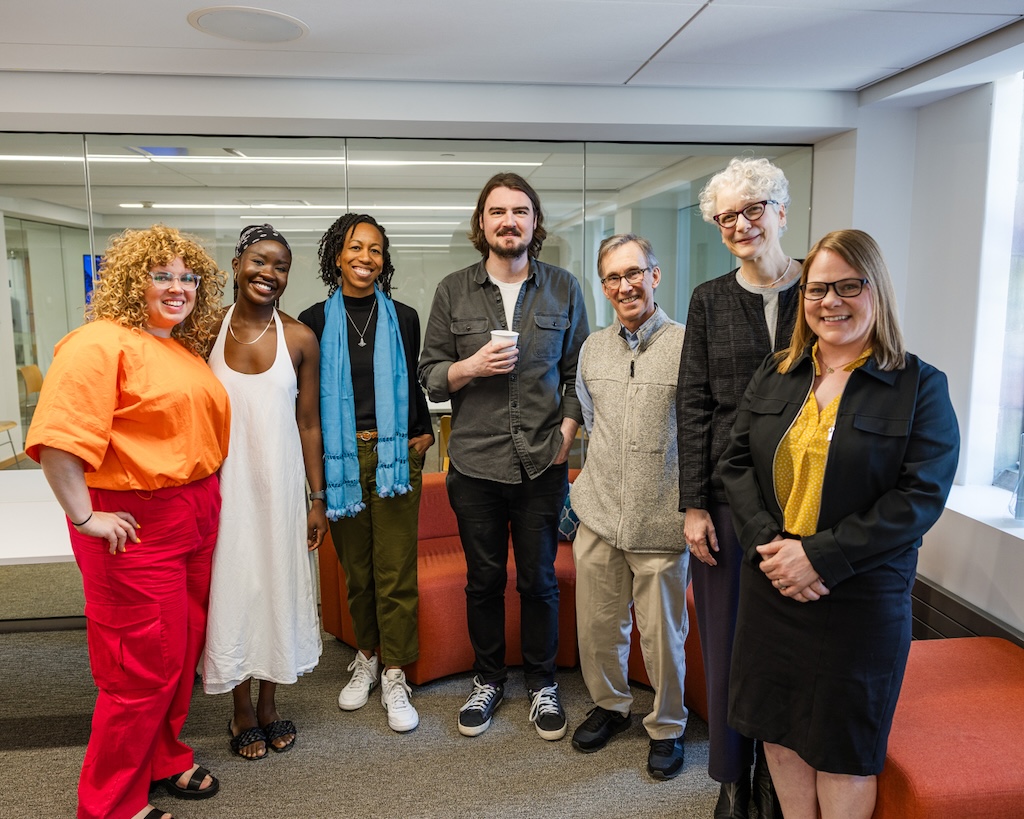
The Poorvu Center for Teaching and Learning hosted two events in April, organized by the Graduate Writing Lab, in continued recognition of its tenth anniversary year. The events featured distinguished guests representing fields across various industries, who shared valuable insights about communicating research to broad audiences.
In early April, the Center welcomed award-winning science writer and New York Times columnist Carl Zimmer for a first-of-its-kind event to help early-career scientists strengthen their science writing for public audiences. The event drew graduate students specializing in diverse STEM fields, ranging from public health and biological sciences to engineering and astronomy. On April 29, the team then hosted their annual “Dissertation to Book” event, welcoming editors from renowned academic presses to advise graduate students in the humanities, social sciences, and interdisciplinary research fields interested in publishing their dissertation work.

Science Writing with Carl Zimmer
Communication is core to any scientist’s work, and there is an increasing recognition that scientists must clearly demonstrate the meaning of their work and its benefits to society. It has never been more critical for scientists to communicate the impact of their work beyond professional circles. Described by New York Magazine as “the country’s most respected science journalist,” Zimmer shared insider tips and best practices developed throughout his storied career. Over two afternoons, he worked with graduate students to understand the nuances unique to science writing and provided tangible advice to help students strengthen their skills. Zimmer offered several key takeaways, including avoiding jargon and technical terms, using active voice, incorporating metaphors, and choosing words carefully to prevent misrepresentation or manipulation.
Students were paired with peers representing different academic disciplines to interview one another and gain experience writing about unfamiliar topics. During the second session, time was allotted for peer review of their draft articles, with Zimmer providing feedback. Students were then invited to continue refining their articles after the event and submit them to the Graduate Writing Lab for review and publication.
“The goal was to give graduate students who are already committed to public science communication an opportunity to hone their skills,” said Lauren Gonzalez, Assistant Director of Scientific Communication in the Graduate Writing Lab. “We wanted participants to come away with an enhanced ability to identify broadly interesting scientific stories, interview experts, and convert that material into a compelling story.”
This event allowed early-career scientists to gain experience writing about science for broad, public audiences – which differs significantly from academic writing and requires a unique skill set. “In planning these workshops with Carl,” explains Graduate Writing Lab Director Ryan Wepler, “we were eager for participants to gain hands-on experience interviewing, researching, and communicating major developments in their field to members of the broader public who are impacted by this work.”

Dissertation to Book Panel Event
On April 29, editors and publishers from top university and trade presses joined the Poorvu Center for a special event to share their expertise with graduate students from the humanities, social sciences, and interdisciplinary fields, hoping to publish their dissertation work. Jim Lance, Senior Editor at Cornell University Press, Anne Savarese, Publisher from Princeton University Press, and Ian Van Wye, Associate Editor from Farrar, Straus and Giroux joined a panel discussion to share insights on such topics as crafting a book proposal, best practices for selecting and approaching editors, and transforming a dissertation into a book.
“I love witnessing the synergy between the editors and our graduate students during this event each spring,” said Julia Istomina, Graduate Writing Lab Associate Director. “University Press Editors always fully invest in getting to know our students and providing valuable insights about the publishing process. It’s clear that they want to learn about the dissertation projects Yale’s graduate scholars are writing. Our students also appreciate this peek behind the curtain of the publishing process!”
Prior to the panel discussion, students were invited to meet individually with an editor to gain personalized feedback about their writing. The event was organized by Graduate Writing Lab Teaching Fellow Cirũ Wainaina in collaboration with Writing Fellows Alison Kibbe and Jeania Ree Moore. As one student noted in the program evaluation, “The university press editors gave a helpful perspective. Not only was their content useful, but it was good for me to humanize the people behind editorial decision-making.”

This was the 16th year of the Dissertation to Book event, which has proved mutually meaningful for both students and our expert guests. In fact, several editors have chosen to accept our invitation to return multiple times. “I view my editorial role as cultivating a process of entrustment between the author and the editor,” explained Jim Lance. “I always find it extremely humbling when, like today, ten perfect strangers had the courage to share and entrust their work with me. It’s a real calling.”
As was the case with the science writing workshops with Carl Zimmer, this event helped students think about the broader impact of their writing, which has been a significant focus for the Poorvu Center and its Graduate Writing Lab this year. New workshops, in addition to these programs, have been organized to help students focus on best writing practices for policy memos, op-eds, academic blogging, magazine writing, and even podcasting. These events are made possible by the Graduate Fellows on staff who lend their expertise to writing and delivering these workshops.
“These events further the Graduate Writing Lab’s mission to help graduate students bring their research to a range of audiences beyond Yale,” said Ryan Wepler. “We are grateful to our expert guests who thoughtfully shared their wisdom and experience with our students.”
Director of Communications, Poorvu Center for Teaching and Learning
